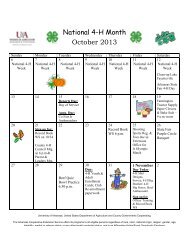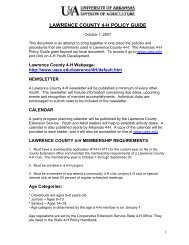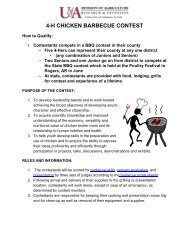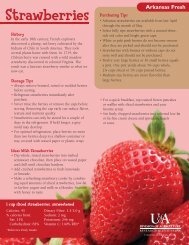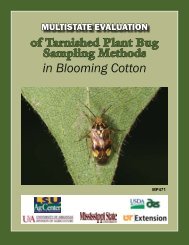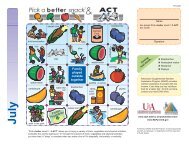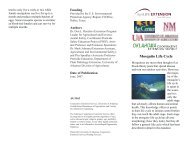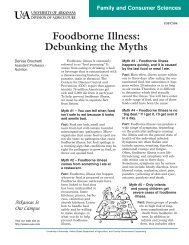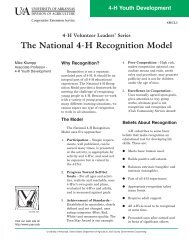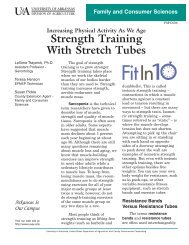Prescription Drug Abuse: when families become drug dealers - MP491
Prescription Drug Abuse: when families become drug dealers - MP491
Prescription Drug Abuse: when families become drug dealers - MP491
Create successful ePaper yourself
Turn your PDF publications into a flip-book with our unique Google optimized e-Paper software.
63% of teens get <strong>drug</strong>s from<br />
parents’ medicine cabinets<br />
(PAT Study, 2009)<br />
Arkansas has one of the<br />
highest rates of nonmedical<br />
pain reliever use among<br />
12 to 25 year olds. (DHHS)<br />
21% of Arkansas high school<br />
seniors say they’ve abused<br />
Rx <strong>drug</strong>s. (APNA Student Survey, 2009)<br />
33% of teens think<br />
“there’s nothing<br />
wrong” with<br />
using Rx <strong>drug</strong>s<br />
(SAMHSA)<br />
NOTE: When used correctly and under a doctor’s<br />
supervision, Rx medicines are safe and effective.<br />
Resources<br />
National Council on Patient Information and<br />
Education (NCPIE) is a multidisciplinary coalition<br />
of over 100 organizations working to stimulate and<br />
improve communication of information on appropriate<br />
medicine use to consumers and health care professions.<br />
(301) 656-8565 or www.talkaboutrx.org<br />
Arkansas DEA National Takeback Initiative<br />
An Arkansas statewide initiative to encourage people to<br />
bring back their unused or unneeded <strong>drug</strong>s for proper<br />
disposal. The website lists take back sites along with<br />
Arkansas-specific statistics. www.artakeback.org<br />
National Institute on <strong>Drug</strong> <strong>Abuse</strong> (NIDA)<br />
Information for Parents and Teachers provides<br />
materials developed specifically with parents in<br />
mind. www.nida.nih.gov/parent-teacher.html<br />
Substance <strong>Abuse</strong> and Mental Health Services<br />
Administration (SAMHSA) The Family Guide is a<br />
public education website that serves as a resource to<br />
keep youth mentally healthy and <strong>drug</strong> free.<br />
(240) 276-2548 or www.family.samhsa.gov<br />
The Partnership for a <strong>Drug</strong>-Free America<br />
A nonprofit organization that unites parents, scientists<br />
and communications professionals to help <strong>families</strong> raise<br />
healthy <strong>drug</strong>-free children. www.<strong>drug</strong>free.org<br />
ioit2me Another Arkansas-specific <strong>drug</strong> prevention<br />
website. www.ioit2me.com<br />
<strong>MP491</strong><br />
Margaret Harris, Ph.D., is Assistant Professor – Health with the University of<br />
Arkansas Division of Agriculture, Little Rock.<br />
Issued in furtherance of Cooperative Extension work, Acts of May 8 and June 30, 1914, in cooperation<br />
with the U.S. Department of Agriculture, Director, Cooperative Extension Service, University of<br />
Arkansas. The Arkansas Cooperative Extension Service offers its programs to all eligible persons<br />
regardless of race, color, national origin, religion, gender, age, disability, marital or veteran status, or<br />
any other legally protected status, and is an Affirmative Action/Equal Opportunity Employer.<br />
<strong>MP491</strong>-PD-4-11N
Generation Rx<br />
The hidden dangers of Rx abuse:<br />
• Dependence<br />
• Slower brain activity<br />
• Irregular heartbeats<br />
• Dangerously high<br />
body temperature<br />
• Heart failure<br />
• Lethal seizures<br />
• Accidental overdose<br />
• Increased possibility<br />
of suicide attempts<br />
Many parents talk to teens about the<br />
harm illegal <strong>drug</strong>s can cause. But did<br />
you know that prescription medicine<br />
can be dangerous too? Youth age 12 to 25<br />
have the highest rates of Rx abuse.<br />
Teens often believe that medicine is much<br />
safer to use than illegal <strong>drug</strong>s and that pain<br />
relievers are not addictive. Not realizing the<br />
risks, teens are turning to prescription <strong>drug</strong>s to<br />
fit in with friends or help cope with stress.<br />
And prescription <strong>drug</strong>s are much easier to get<br />
than illegal <strong>drug</strong>s.<br />
As a parent or someone who interacts<br />
with teens, this is where you come in. It’s<br />
important to explain to your teen the dangers<br />
of Rx <strong>drug</strong> abuse. If you recognize any of the<br />
warning signs, contact the resources provided<br />
in this brochure, your teen’s physician or<br />
other health care professional.<br />
What you can do:<br />
•Recognize the Risks — all medicines,<br />
including prescription and over-the-counter,<br />
have risks along with benefits. These risks<br />
increase dramatically <strong>when</strong> they are abused.<br />
•Talk to your teen about Rx medicines.<br />
Provide a safe, open environment for your<br />
teen to talk about abuse issues.<br />
•Teach your teen respect for the power of<br />
medicine and how to use it properly.<br />
Warning Signs:<br />
•Fatigue, red or glazed eyes<br />
and repeated health complaints.<br />
•Sudden mood changes: irritability,<br />
negative attitude, personality changes and<br />
lack of interest in hobbies or activities.<br />
•Secretiveness and withdrawing from family.<br />
•Decreased/obsessive interest in school work.<br />
•Missing prescription medicines from your<br />
medicine cabinet. Check frequently!<br />
•Additional filled prescriptions on your<br />
pharmacy record that you did not fill.<br />
•Avoid stockpiling medicines. Keep them<br />
in a safe place or locked up. Dispose of unused<br />
medications promptly.<br />
•Properly dispose of unused Rx medicines<br />
by taking them to your community take-back<br />
program. If none is present, mix unused meds<br />
with an undesirable substance, such as used<br />
coffee grounds or kitty litter; put the mixture in<br />
a sealed, nondescript container and throw it in<br />
the trash. Do not flush unused medications.<br />
•Seek help at the first sign of a problem.<br />
Alert your family physician if you are<br />
concerned. Ask him to speak to your teen<br />
about the importance of proper medicine use.<br />
Many teens believe that medicine is much safer to use than illegal <strong>drug</strong>s.<br />
1 in 5 teens share their prescription <strong>drug</strong>s with friends. (Join Together, 2009)




